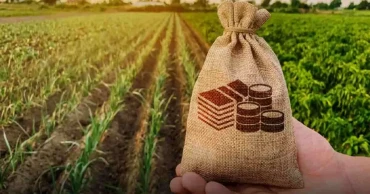Agricultural Development
Bangladesh earmarks Tk 385 billion for agriculture, aiming for 10% annual growth by fiscal 2026
The Bangladesh government has earmarked Tk 385 billion for agricultural development over the next three years, targeting an average annual growth of 10% in the sector by the 2025-26 fiscal year.
This investment underscores agriculture's pivotal role in achieving food security and driving equitable economic growth, according to the 'Medium Term Macroeconomic Policy Statement (2023-24 to 2025-26)'.
Despite a diminishing share in GDP, agriculture remains critical for the livelihood of the majority, particularly in rural areas. To boost food production and resilience against adversities, the government's strategy includes developing high-yield and adversity-tolerant crop varieties, expanding mechanization and irrigation, and improving access to affordable inputs like seeds and fertilizers.
No respite from heat wave in five days: BMD
The policy document highlights several initiatives aimed at modernizing agriculture through technology. These include increasing the use of surface water for irrigation over groundwater to conserve resources, incorporating renewable energy solutions, and employing remote sensing for crop monitoring.
The government also continues to support the sector with subsidies, financial incentives, and technological innovations to foster a sustainable and self-reliant agricultural framework.
Significant contributions also come from the fisheries and livestock sub-sectors, which not only bolster GDP—2.53% and 1.91%, respectively—but also provide essential protein sources and livelihoods for over 12% of the population. Achievements in these areas include self-sufficiency in fish, meat, and egg production, with milk expected to follow. Moreover, these sectors are vital for foreign exchange earnings through exports.
Looking ahead, the Ministry of Livestock and Fisheries is set to launch development projects to enhance production capacities, adopt advanced management technologies, and improve conservation efforts, particularly for young hilsa fish ('jatka').
Water resource management is another focal area, given its importance to sustainable agriculture. Initiatives are underway to improve surface water availability through the excavation of water bodies and the enhancement of coastal afforestation, aiming to secure equitable water shares from transboundary rivers.
NAP Expo 2024: Bangladesh to showcase climate adaptation success, Environment Minister says
Amid threats of substantial economic losses due to climate change—projected at a 6.8% reduction in GDP by 2030—the government has prioritized comprehensive strategies to mitigate these impacts. The Mujib Climate Prosperity Plan is designed to equip vulnerable sectors and communities with the tools to enhance resilience and stability against climate-related disruptions.
Through these multifaceted efforts, Bangladesh is taking decisive steps to not only safeguard but also advance its agricultural heritage in the face of evolving global challenges.
1 year ago
Food for All: AL Manifesto Emphasizes Agricultural Development for a Hunger-Free Bangladesh
"Food for All" is the core goal and commitment of the Awami League. The manifesto pledges to build a hunger-free Bangladesh. On Wednesday (December 27), the Awami League announced this manifesto for the 12th national parliamentary election.
Agriculture is a primary driving force of Bangladesh's economy and livelihoods. Agriculture plays a crucial role not only in fulfilling the food and nutritional needs of the population but also in providing employment in rural areas, supplying raw materials to industries, and increasing export earnings. Following independence, Father of the Nation Bangabandhu Sheikh Mujibur Rahman, initiated an agricultural revolution by taking ground-breaking steps to enhance production and ensure food security, giving utmost importance to the development of agriculture and farmers. Currently, under the leadership of Bangabandhu's daughter, Sheikh Hasina, the Awami League government also prioritizes agriculture in state governance. With the commitment of "Food for All," the party emphasizes agricultural development in its manifesto for the 12th national parliamentary election.
PM Hasina unveils AL election manifesto promising dev, peace, prosperity
In the fiscal year 2022-23, rice production surpassed all previous records. Currently, Bangladesh ranks third globally in the production of rice, vegetables, and onions. Additionally, it holds the second position in jute production, fourth in tea, and seventh in potato production. Significant progress has been made in cultivating both domestic and foreign fruits. Farmers are encouraged to cultivate profitable but unconventional crops like coffee, cashew nuts, black pepper, malta (a type of citrus), and dragon fruit. The per capita fruit consumption rate, which was 55 grams in 2006, increased to 85 grams in 2023. In the last 15 years, 699 new crop varieties resilient to adverse environments and 708 technologies have been developed. The mechanization of agriculture is underway to modernize it. From 2010 to 2023, nearly 133,000 agricultural machineries, including combine harvesters, reapers, seeders, and power tillers, have been distributed to farmers at subsidized prices. A 3,000 crore taka agricultural mechanization project is ongoing. Overall, the country's agricultural system is transitioning from subsistence farming to commercial agriculture.
AL to announce election manifesto Wednesday
To maintain this trend, the Awami League, led by Prime Minister Sheikh Hasina, pledges to follow sustainable development strategies based on planned initiatives. The strategy aims to meet the growing population's nutritional needs, ensure the supply and accessibility of nutritious food for all, develop commercial agriculture, expand agriculture-dependent industries, improve rural infrastructure, increase and diversify exports of agricultural and non-agricultural products, and enhance the quality of life in rural communities through poverty alleviation. The annual budget allocation will be increased, and private investment in the rural sector will be encouraged.
Awami League’s Commitment
"Food for All" remains the Awami League's primary goal and commitment. The trend of following sustainable development strategies, based on a contextualized plan for the development of agriculture, farmers, and the rural economy, will continue. The strategy includes ensuring nutrition for the growing population, supplying and accessing nutritious food for everyone, developing commercial agriculture, expanding agriculture-dependent industries, improving rural infrastructure, increasing and diversifying exports of agricultural and non-agricultural products, and enhancing the living standards of rural communities through poverty alleviation. The annual budget allocation will be increased, and private investment in the rural sector will be encouraged.
The daughter of Bangabandhu pledges to expand the initiatives already taken to increase agricultural production. The provision of agricultural loans at 4% concessional interest will continue; the central bank will refinance commercial banks at a 0.5% rate, encouraging them to distribute more agricultural loans. The Awami League will continue to provide assistance and subsidies for agricultural production and investment in agricultural inputs. Easy access to and availability of agricultural machinery will be ensured to alleviate labor shortages in agriculture and increase productivity. Subsidies on agricultural machinery will continue.
The Awami League government has already implemented a policy to bring all land under cultivation to further increase agricultural production. Sheikh Hasina's commitment is that no land will remain uncultivated. Emphasis will be placed on developing an integrated agricultural system.
Furthermore, to build a smart, agriculture-dependent Bangladesh, strategies will be adopted for commercial agriculture, biotechnology, genetic engineering, robotics, artificial intelligence, and nano-technologies, as well as for developing the rural non-agricultural sector and facing globalization challenges. The focus on modernizing agriculture, innovating technology, and increasing opportunities and facilities for agricultural research will continue. Environmental protection will also be seriously considered in the use of various products in agriculture.
Read more: Govt prepared to ensure food security into the future: Agriculture Minister
Not only agriculture, but also the fisheries and livestock sectors are immensely important for ensuring food security, meeting nutritional needs, creating employment, alleviating poverty, expanding export trade, and overall socio-economic development in Bangladesh. To meet the animal protein demand of the growing population, create entrepreneurs and employment, and keep the rural economy active, Sheikh Hasina's government is also giving equal importance to the fisheries and livestock sectors. The Awami League's commitments in this continuity are:
1. To increase the productivity of livestock by one and a half times by 2028.
2. To establish commercial dairy and poultry farms, increase self-employment, and alleviate poverty by providing loans on easy terms, necessary subsidies, technical advice, and policy support.
3. To increase the domestic production of quality animal feed ingredients, expand processing technology, and ensure reasonable prices.
4. To diversify, process, and expand export-oriented industries of animal products.
5. To expand farm mechanization and automated production systems in preparation for the Fourth Industrial Revolution.
6. To increase fish production from 4.915 million metric tons to 5.840 million metric tons and to raise the per capita fish consumption from 67.8 grams/day to 75 grams/day by ensuring sustainable fish production and achieving food security through maximum utilization of resources.
7. To strengthen sustainable management of marine fisheries resources and ensure responsible fishing for the development of the blue economy.
8. To adopt projects/programs based on delta hotspots for coping with the adverse effects of climate change, improving the quality of life of local communities, adaptation, and capacity building.
9. To reduce fish waste by 10% and create employment for about 600,000 people in the next five years by ensuring sustainable use of fish resources through value chain development and diversifying value-added fish and fishery products.
10. To encourage the private sector to increase fish and fishery product exports and expand new markets abroad by organizing Fish Expos and establishing exclusive economic zones for fishery product processing, aiming to increase export earnings from 4,790 crore to 15,000 crore taka.
11. To expand ongoing programs for increasing livestock production and to enhance opportunities and facilities for processing, marketing, and value addition of these products.
12. To continue fish farming in ponds and, where possible, in rice fields by providing quality fish fry, food, and disease treatment.
13. To provide easy access to capital, electricity connections, and other facilities for farmers.
Read more: Food security remains protected amid int’l crisis: PM Hasina tells Parliament
2 years ago
IFAD to provide US$18.07mn to Bangladesh for COVID-19 recovery activities
The International Fund for Agricultural Development (IFAD) will provide Bangladesh with an additional loan of US$ 18.07 million to rebuild microenterprises and support smallholders, who have been affected adversely by the COVID-19 pandemic.
5 years ago




